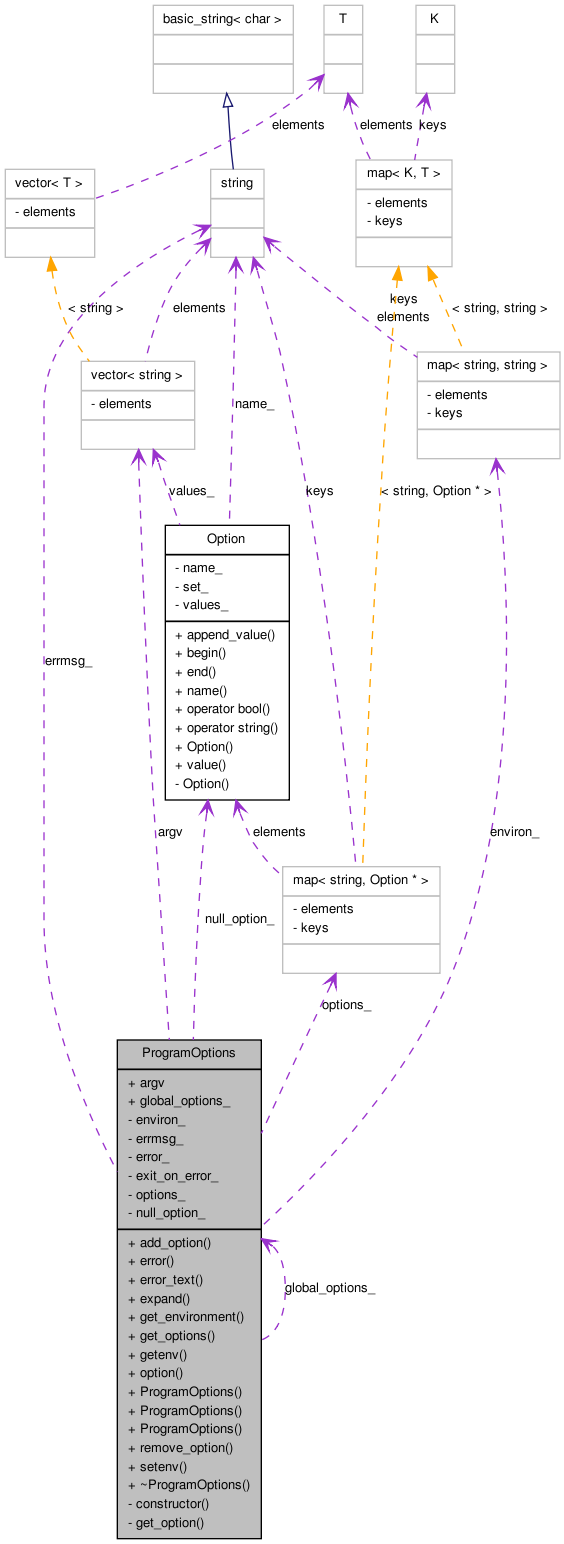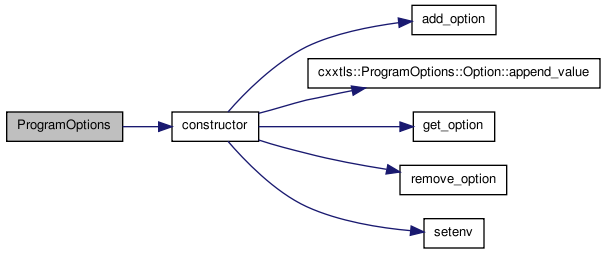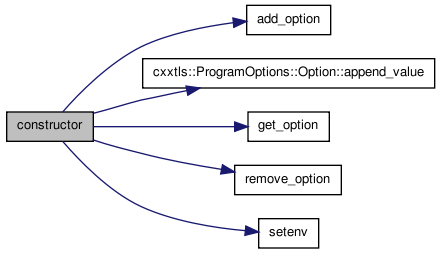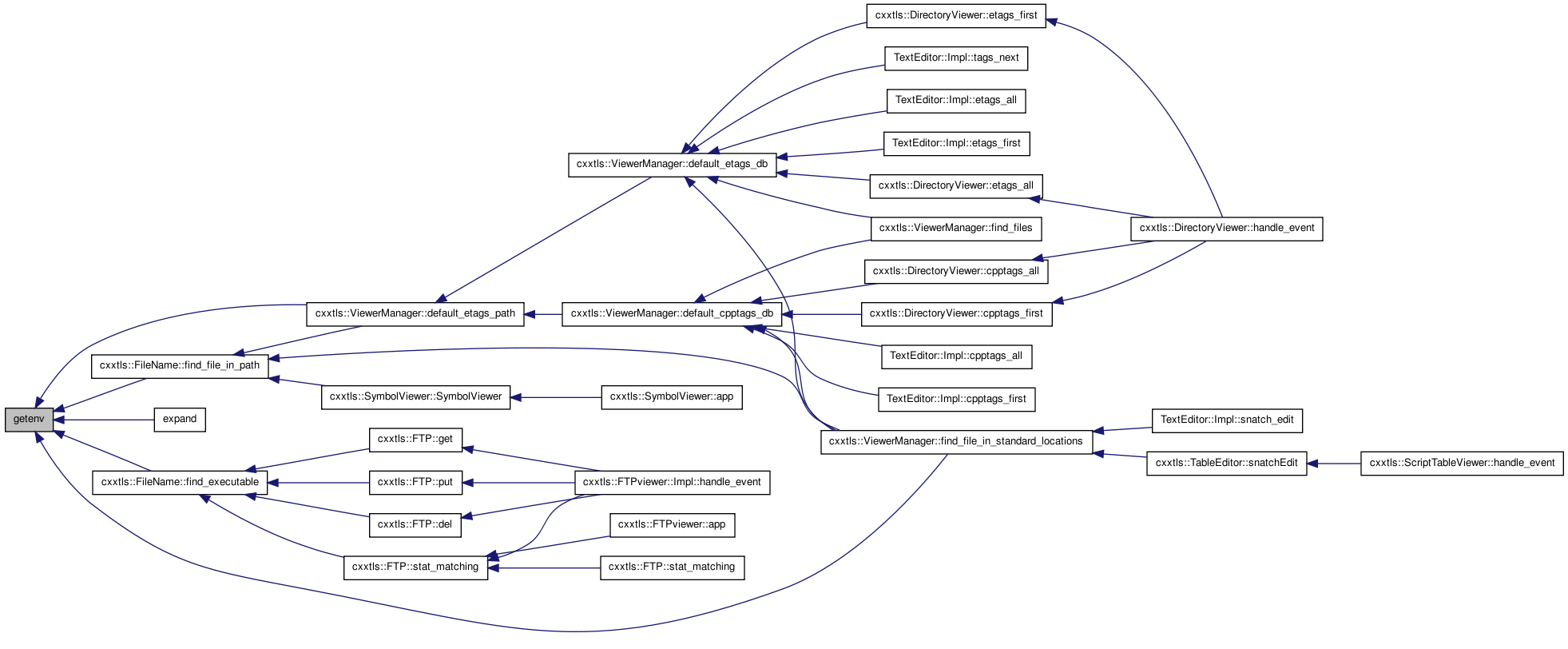ProgramOptions Class Reference
Class ProgramOptions represents the command line options and environment passed to a program by the operating system. A ProgramOptions object can be viewed as a map of environment variables as well as a list of non-option command parameters, and finally a map of options and their parameters. More...
#include <options.h>

Classes | |
| class | Descriptor |
| The description of a single option's type -- not its values, for that see ProgramOptions::Option. More... | |
| class | Descriptors |
| A collection of Descriptor's of options. This is a thin wrapper around a vector<Descriptor> Its main purpose is to define the add_option method so that the interface to array of descriptors becomes simpler to use. More... | |
| class | EnvVar |
| An EnvVar object exists to provide information about environment variables stored in the map of environment variables without having the user know about the implementation. Here is how an EnvVar is used: More... | |
| class | Option |
| Interface to a given option. See documentation for it in the ProgramOptions class. More... | |
Public Types | |
| enum | allowed_parms_ { no_values, one_value, many_values } |
Symbolic names for the parms parameters for add_options and Descriptors::Descriptors(). More... | |
| typedef std::map< string, string > | Environment |
| fast access to program env. | |
| typedef std::vector< string > | option_values |
| storage type for option values | |
| typedef std::map< string, Option * > | Options |
| typedef std::string | string |
| typedef option_values::const_iterator | value_iterator |
| iterator for option values | |
Public Member Functions | |
| Option & | add_option (string const &name) |
| Create a new option with no values in it. That is, it pretends that an option was set in the argv passed in at construction time. This kind of option does not need to appear in the option descriptors used at construction time. | |
| bool | error () const |
| Indicates that an error occurred while processing the options. Unless you construct the options with the exit_on_error parameter set to false, this function will never return anything but false. | |
| string const & | error_text () const |
| Returns the text of the error message, if any, corresponding to the error that occured when parsing the options. This will never return a non-zero string unless you construct the options with exit_on_error=false. | |
| std::string | expand (std::string const &) const |
| Return a copy of the input string with environment variable references expanded. An environment variable reference is a substring of the form '$name' where the name can take either of the following forms: | |
| Environment const & | get_environment () const |
| Get the actual environment so the user can iterate over the variable, not just check them out, one by one. Rarely done, but useful in testing. | |
| Options const & | get_options () const |
| Get a list of the options that are set so that you can iterate over it in some way -- mainly for testing. | |
| EnvVar | getenv (string const &name) const |
| Get an environment variable given its name. EnvVar is a wrapper class that lets you tell whether or not the variable is set or not as well as get its values. See ProgramOptions::EnvVar for details of using the return value. | |
| Option const & | option (string const &name) const |
| Remove an option and its values. | |
| ProgramOptions () | |
| ProgramOptions (std::string option_descriptor_string, int argc, char const *const *argvp, char const *const *environ, bool exit_on_error=true) | |
| Construct program options and an environment from those passed in by the operating system. See the class comments for details of using this constructor. This constructor. | |
| ProgramOptions (Descriptors const &desc, int argc, char const *const *argvp, char const *const *environ, bool exit_on_error=true) | |
| void | remove_option (string const &name) |
| void | setenv (string const &name, string const &value) |
| Set a new value in the evironment or change an old one. Note that this does not update the real program environment. That getenv() won't get you the value you just set. | |
| ~ProgramOptions () | |
| destroys the options map and everything else | |
Public Attributes | |
| option_values | argv |
| non-option args are public arg0 is program name as usual | |
Static Public Attributes | |
| static ProgramOptions * | global_options_ = 0 |
| list of options and their values if any. The map key points to the string name_ field in the Option object. | |
Private Member Functions | |
| void | constructor (Descriptors const &desc, int argc, char const *const *argv, char const *const *environ, bool exit_on_error=true) |
| constructor() is the 'real' constructor. It is a separate function so that it can be called as a function by the constructor that takes a character string defining the descriptors. | |
| Option * | get_option (string const &) |
| get a writeable pointer to the named option. | |
Private Attributes | |
| Environment | environ_ |
| map of environment variables | |
| string | errmsg_ |
| return by error_text (text parsing options error) | |
| bool | error_ |
| error occurred while parsing options | |
| bool | exit_on_error_ |
| flag saying user wants control of error handling | |
| Options | options_ |
| list of options and their values if any. The map key points to the string name_ field in the Option object. | |
Static Private Attributes | |
| static Option | null_option_ |
| static option which indicates that it isn't set. | |
Detailed Description
Class ProgramOptions represents the command line options and environment passed to a program by the operating system. A ProgramOptions object can be viewed as a map of environment variables as well as a list of non-option command parameters, and finally a map of options and their parameters.
While it is possible to have more than one ProgramOptions active at any one time, in general the use of this class is to represent _the_ program options. Thus there is a global variable holding this single program options declared by this header. See ProgramOptions::global_options below. If this pointer is null, then no options are set.
For example, if a program is invoked in the following way:
program -h -I. -I .. -I ../.. -stuff file file2 file3 ...
The ProgramOptions are described like this:
- non-optional parameters: file, file2, file3, etc
- options without parameters: -h, -stuff
- options with parameters: -I has ., .., ../..
And of course the environment comes in 'behind' the command line, as it were.
Once constructed, a ProgramOptions object provides the following members:
- argv a vector<string> containing the non-optional arguments
- getenv(n) a way of getting the program's environment variables
- option(n) a way of getting an option's value
- setenv(n,v) a way of setting environment variables
Note that there is no connection between a ProgramOptions object's copy of the program environment and the real program environment -- except that one is copied from the other at the time of construction.
Here is an example of constructing and using a ProgramOptions object:
int main(int argc, char **argv, char **environ) { // Parse the command line options and arguments and environment -- // AND store the arguments in the default GLOBAL place so that // all parts of the program can have access to them. ProgramOptions::global_options_ = new ProgramOptions("-x,-y,-z", argc, argv, environ); ProgramOptions &op = *ProgramOptions::global_options_; // a local variable to make the accesses easier to understand // Use the parsed options and arguments if( op.option("-x") ) // operator int() tells you if option is set { string s = op.option("-x").value(); // operator string() converts value to string but some compilers // this is buggy, so use .value() } // here is the easy to check for environment variables and to set them if( op.getenv("PATH") ) { string path = op.getenv("PATH"); // string conversion } else { op.setenv("PATH", "stuff"); } // Here's how you access non-option arguments for(int i=0; i < op.argv.size(); ++i) cout << op.argv[i] << endl; // Here's how you iterate over all environment items ProgramOptions::environment const& env = op.get_environment(); ProgramOptions::environment::const_iterator f = env.begin(); ProgramOptions::environment::const_iterator l = env.end(); while(f != l) { cout << f->first << "=" << f->second << endl; ++f; } }
The 'value' of an option is an array of string objects. Even if there is no value, or if there is only 1 allowed value, an option is stored as an array of strings. Thus you can iterate over the values in an option using the same algorithm -- regardless of the kind of option it is. The option member, operator string(), converts all the values into a comma separated string and returns that. You can iterate over the individual values of an option like this:
ProgramOptions::value_iterator first = op.option("-x").begin(); ProgramOptions::value_iterator last = op.option("-x").end(); while(first != last) { string v = *first++; }
Note, if the double lookup of op.option("-x") bothers you, do this
ProgramOptions::Option const& option = op.option("-x"); ProgramOptions::value_iterator first = option.begin(); ProgramOptions::value_iterator last = option.end(); ...
Note: if an option does not take values, then it is viewed as a boolean flag. If the user supplies it multiple times on the command line, the value will be toggled with each use.
When one character options take values, these values can be supplied as part of the option -- as occurs with the -I option to compilers, but multiple character option names must be separated from their values:
-I../../junk.h // works -stuff../file.h // wrong will not be recognized.
When constructing an options object, you may optionally choose to instruct it not to print an error to stdout and exit if any options are not recognized -- as is the default behaviour. If you choose this mode of operation, use ProgramOptions::error() to determine if an error in processing the options has occurred. It should return false to indicate that no error occurred. If it returns true, use ProgramOptions::error_text() to find out what the error is.
When constructing ProgramsOptions and supplying a description of the options as a string, use the following constructor syntax:
ProgramOptions op(option_declaration_string, argc, argv, environment, fail_on_error_flag);
Note that the fail_on_error_flag is optional and defaults to true;
When definiting an options object and passing it a string describing the options, rather than array of descriptors, the string must conform to the following:
The string is a collection of parameter names followed by terminator that indicate the number parameters for the option. A ":" means 1 parameter, a ";" means multiple parameters, and a "," means no parameters. For example: "-a,-queue,-bee:-c;-d" Means: Accept an option 'a' that takes no arguments accept an option 'queue' that takes no arguments accept an option, 'bee', that takes 1 argument accept an option, 'c', that takes multiple arguments (meaning that you can use it multiple times an suply a new option on each use) accept an option 'd' that takes no arguments.
Here's how to process options which allow multiple values to be set:
if(options.option("-I")) { ProgramOptions::value_iterator f, l; f = options.option("-I").begin(); l = options.option("-I").end(); while(f !=l) { useString(*f); ++f; } }
Definition at line 45 of file options.h.
Member Typedef Documentation
| typedef std::map<string,string> Environment |
| typedef std::vector<string> option_values |
Member Enumeration Documentation
| enum allowed_parms_ |
Constructor & Destructor Documentation
| ProgramOptions | ( | Descriptors const & | desc, | |
| int | argc, | |||
| char const *const * | argvp, | |||
| char const *const * | environ, | |||
| bool | exit_on_error = true | |||
| ) |
Construct program options and an environment from those passed in by the operating system. See the class comments for details of using this constructor. This constructor requires that you supply a vector of descriptors. The next constructor accepts a character string describing the options.
Definition at line 292 of file options.h.

| ProgramOptions | ( | std::string | option_descriptor_string, | |
| int | argc, | |||
| char const *const * | argvp, | |||
| char const *const * | environ, | |||
| bool | exit_on_error = true | |||
| ) |
Construct program options and an environment from those passed in by the operating system. See the class comments for details of using this constructor. This constructor.
Definition at line 420 of file options.cxx.

| ProgramOptions | ( | ) |
| ~ProgramOptions | ( | ) |
destroys the options map and everything else
Definition at line 300 of file options.cxx.
Member Function Documentation
| ProgramOptions::Option & add_option | ( | string const & | name | ) |
Create a new option with no values in it. That is, it pretends that an option was set in the argv passed in at construction time. This kind of option does not need to appear in the option descriptors used at construction time.
Definition at line 259 of file options.cxx.

| void constructor | ( | Descriptors const & | desc, | |
| int | argc, | |||
| char const *const * | argv, | |||
| char const *const * | environ, | |||
| bool | exit_on_error = true | |||
| ) | [private] |
constructor() is the 'real' constructor. It is a separate function so that it can be called as a function by the constructor that takes a character string defining the descriptors.
Definition at line 50 of file options.cxx.


| bool error | ( | ) | const |
| string const& error_text | ( | ) | const |
| string expand | ( | std::string const & | in | ) | const |
Return a copy of the input string with environment variable references expanded. An environment variable reference is a substring of the form '$name' where the name can take either of the following forms:
$[0-9] -- command line parameter expansion
$[a-zA-Z_][0-9a-zA-Z_]* -- environment variable expansion
Here is an example expansion:
static char *args[]= { "zero", "one", "two", 0 }; options.setenv("fred", "freddy boy"); std::string rv = options.expand("$1-$fred-");
After expansion, rv will contain "one-freddy boy-".
Obviously, only the first 9 program parameters can be included in expansions of this form. This restriction is kept in order to be consistent with the behavior of most shell interpreters.
Definition at line 484 of file options.cxx.

| Environment const& get_environment | ( | ) | const |
| ProgramOptions::Option * get_option | ( | string const & | name | ) | [private] |
get a writeable pointer to the named option.
Definition at line 378 of file options.cxx.

| Options const& get_options | ( | ) | const |
| ProgramOptions::EnvVar getenv | ( | string const & | name | ) | const |
Get an environment variable given its name. EnvVar is a wrapper class that lets you tell whether or not the variable is set or not as well as get its values. See ProgramOptions::EnvVar for details of using the return value.
Definition at line 286 of file options.cxx.

| ProgramOptions::Option const & option | ( | string const & | name | ) | const |
Remove an option and its values.
Find the option or return a reference a static option that will tell you that it doesn't exist.
Definition at line 405 of file options.cxx.


| void remove_option | ( | string const & | name | ) |
Set a new value in the evironment or change an old one. Note that this does not update the real program environment. That getenv() won't get you the value you just set.
Definition at line 279 of file options.cxx.

Member Data Documentation
Environment environ_ [private] |
bool error_ [private] |
bool exit_on_error_ [private] |
ProgramOptions * global_options_ = 0 [static] |
ProgramOptions::Option null_option_ [static, private] |
The documentation for this class was generated from the following files:
- include/cxxtls/options.h
- lib/options.cxx

 1.6.3
1.6.3